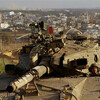
At the beginning of 2004, Israeli forces were making Palestinian refugees homeless in southern Gaza on the border with Egypt. Now they’re doing the same in Jabalia refugee camp in the north of the Gaza Strip. The Israeli government has a plan for “disengaging” from Gaza but has in fact brought additional troops and equipment into Gaza in the past week. Some 60 Palestinians have been killed, most of them civilians including children, more than 200 have been injured, homes have been destroyed and businesses and farms have been damaged in the past week in and around Jabalia. Read more about Gaza under Attack: Is this disengagement?
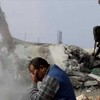
So far this month, more than 2,000 Palestinians, most of them refugees, have been made homeless, some for a second time in the past two years and more house demolitions have been promised by the Israeli authorities. Almost 20,000 Palestinians in Gaza have been made homeless in the last three years. During the 1930s the British forces in Palestine started to use house demolition as a means of quelling the indigenous uprising against British rule. Since 1948, it is estimated that Israel has demolished well over 200,000 Palestinian homes. Read more about A history of destruction

In the past 87 years since Lord Balfour wrote to Lord Rothschild declaring that the United Kingdom favored the establishment of a national home for the Jewish people in Palestine, the world has seen dispossession, depopulation, confiscation, and uprooting. Now with the 15 April 2004 declaration of George W. Bush, Israel’s seizure of large areas of the West Bank and Gaza and the removal of Palestinian inhabitants have been legitimized, ruling out the establishment of a contiguous Palestinian state in the areas of Palestine that are populated by Arab Palestinians. Read more about From Balfour to Bush

“We saw what could not be seen in other visits to the Galilee,” said a Jewish Israeli after visiting six destroyed Palestinians villages in the Galilee area of Israel as part of an Israeli-Palestinian conference, March 26-28 in Haifa, which brought together 300 Israeli Jews, Palestinians, internally displaced Palestinians in Israel, Palestinian and Israeli academics, and supporters of human and civil rights groups in Israel, Palestine and abroad to coordinate their efforts in advancing the rights of Palestinian refugees in general and those inside Israel in particular. A number of invited guests were denied entry to Israel. Read more about Israelis and Palestinians visit destroyed villages, discuss rights of refugees
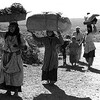
Land Day commemorates the day nearly three decades ago when Israeli security forces shot and killed 6 Palestinians during demonstrations and a general strike called by the Palestinian leadership inside Israel to protest ongoing expropriation Palestinian land to build new Jewish colonies and expand existing Jewish cities. Read more about Palestinian Land Day 2002
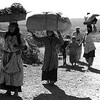
Assassinations, destruction, confiscation, and the snaking of the “apartheid” wall through and around villages, cities and farms continue unabated as a shrinking Palestine marks Land Day on 30 March. In 1948, Palestinians owned more than 90 per cent of the land in historic Mandate Palestine. Today, the indigenous Palestinian population owns and controls about 10 per cent of its homeland. At the same time, more than half of the original Palestinian population has been displaced/expelled from Palestine. Read more about Palestine Shrinks as an Ineffectual World Watches
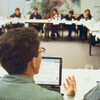
Israelis and Palestinians are discussing the direct link between the protection of Palestinian refugee rights and the establishment of a lasting peace at a conference in Haifa from 26 to 28 March, marking the 28th anniversary of “Land Day”. The conference brings together Israeli and Palestinian academics, supporters of human and civil rights groups to coordinate their efforts in advancing the rights of Palestinian refugees in general and internally displaced Palestinians in Israel. The three-day meeting will include lectures, debate, films and participants will visit six destroyed Palestinian villages in Israel. Read more about Israelis and Palestinians discuss protection of refugees
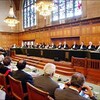
The ICJ hearing represents an historic milestone in the struggle of the Palestinian people for the promotion of rule of law and enforcement of universal standards and principles as the foundation for conflict prevention, resolution and a just and durable peace. It is the first time that the international court will hold deliberations concerning the legal aspects of the long- standing Israeli-Palestinian conflict and Israeli measures directed against the Palestinian people. Read more about A case for the rule of law in Palestine

BADIL’s Arabic-language magazine, Haq Al-Awda (Right of Return), printed and distributed as a supplement to the Ramallah daily paper Al-Ayyam has been distributed to some 30,000 households in the occupied Palestinian Territories. This is the third such supplement prepared by BADIL and distributed via the local press. Begun as a pilot project in 2003, the newspaper supplements have been a success on every level. Earlier editions have sold out and due to strong demand, additional copies have been reprinted. This issue covers a number of current topics and the conclusions of a visit to South Africa. Read more about News supplement on rights of refugees reaches 30,000 households
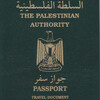
There is only one thing straightforward about the maze of permit regulations for Palestinians in the West Bank and Gaza. Despite the Oslo accords and other interim agreements, all applications for documents end up being approved or rejected by some Israeli authority. Read more about The permit maze









